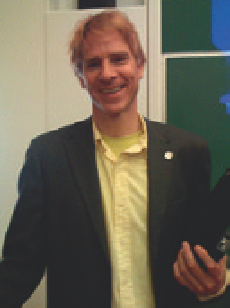Information Technology Reference
In-Depth Information
Consciousness?
In their discussions of consciousness, philosophers often introduce the
idea of a “zombie” as a category of imaginary human being. The philosopher
Daniel Dennett (
B.16.6
) says:
According to common agreement among philosophers, a zombie would be
a human being who exhibits perfectly natural, alert, loquacious, vivacious
behavior but is in fact not conscious at all, but rather some sort of automaton.
The whole point of the philosopher's notion of a zombie is that you can't tell
a zombie from a normal person by examining external behaviors.
20
Philosophers also frequently introduce the idea of
qualia
, the plural of
quale
,
into their discussions of consciousness. Neuroscientist Christof Koch (
B.16.7
)
explains the concept of qualia as follows:
B.16.7. Christof Koch was a profes-
sor of neuroscience at Caltech and,
since 2011, the Chief Scientific
Officer at the Allen Institute for
Brain Science. During the 1990s,
Koch collaborated with the late
Nobel Prize recipient Francis Crick
on the problem of consciousness as
a scientifically addressable problem.
He and Crick co-authored the 2004
topic
The Quest for Consciousness: A
Neurobiological Approach.
What it feels like to have a particular experience is the quale of that
experience: The quale of the color red is what is common to such disparate
percepts as seeing a red sunset, the red flag of China, arterial blood, a ruby
gemstone, and Homer's wine-dark sea. The common denominator of all these
subjects is “redness.” Qualia are the raw feelings, the elements that make up
any one conscious experience.
21
In his attempt to move the debate about consciousness from a philosophical
level to a legitimate topic for scientific investigation, Koch introduces four dif-
ferent definitions of consciousness:
A
commonsense definition
equates consciousness with our inner, mental life …
A
behavioral definition
of consciousness constitutes a checklist of actions or
behaviors that would certify as conscious any organism that could do one or
more of them …
A
neuronal definition
of consciousness specifies the minimal physiologic
mechanisms required for any one conscious sensation …
A
philosopher
[will] give you a fourth definition, “consciousness is what it
is like to feel something.”
22
However, Dennett, in his topic
Consciousness Explained
, takes a different approach
and explicitly abandons the arguments and debates about qualia and avoids
this concept in his own discussion of consciousness.
It is the ability to be self-aware that probably embodies what most people
think is the essence of consciousness. Nevertheless, as we have seen, there
is still a long way to go before computer scientists, cognitive scientists, and
neuroscientists are ready to reach a consensus about strong AI, the mind-body
problem, and consciousness. As philosopher Dennett has said, “Human con-
sciousness is just about the last surviving mystery.”
23
Key concepts
M
Humanoid robots
Unmanned aerial vehicles
M

Search WWH ::

Custom Search